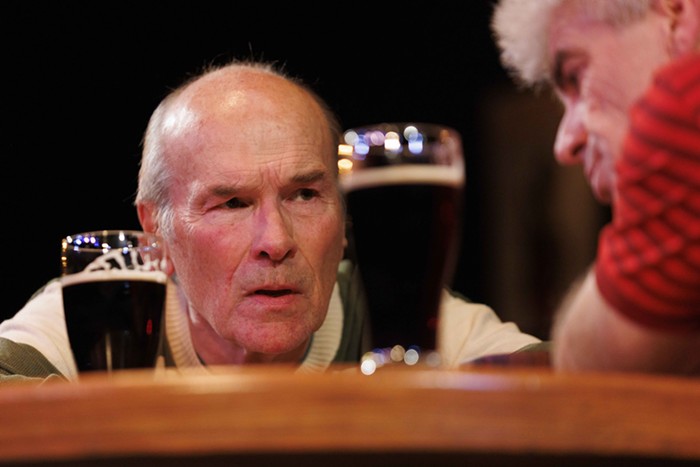The Homecoming
Theater Theatre
Through Nov 18, 242-0080
It's hard to like a play when you don't like any of the characters. I need a hero to pull for if I'm going to be engaged, not just a bunch of lazy, psychotic, emotionless screw-ups. This is unfortunately the case with Harold Pinter's The Homecoming, but it's the fault of the script, not the acting.
Pinter chronicles the trip of the eldest son and his wife from America. The couple comes to visit the son's father, uncle, and brothers (all living in the same house) who live a bickering, cultureless life in England. The brother, initially excited about the visit, is eventually sucked into their black hole of misery, as is his wife.
Despite the somber tone, this Profile Theatre Project production is extremely well acted--including commercial and soap actors in the cast--exciting for those of you who watch daytime television. Max, the father, played by Michael Berkson, epitomizes the old, embittered, self-centered, "When I was a kid, I walked 30 miles to school in eight feet of snow with cement shoes on," kind of grumpy man. His yap flaps relentlessly, constantly bragging about himself, complaining, or telling his brother and sons what to do. His voice becomes so realistically irritating, that it's almost a little too much to take if you happen to be seeing the play on Sunday afternoon. By the end, you're praying that someone either strangles him, or that he croaks on stage.
Leif Norby, as Max's deranged pimp/son Lenny, looks and acts like the embodiment of Satan. His sarcasm is beyond cutting, and his character comes off believably as a maladjusted misogynist in his 30s, who still lives with his dad--someone you would never want to be left alone in a room with.
The oldest and youngest brothers, Teddy and Joey, and their uncle Sam, play less dynamic roles. Teddy is a falsely content and self-congratulating scholar, Joey is a pretty typical dumb, clueless person, and Sam is an easily flustered chauffeur who usually ends up watching the action. Joey, however, does step up his character when he gets it on with Teddy's wife. This part is extremely disturbing because of the long winded dry-humping, especially with the presence of children in the room. The three parts are played well though, and add to the relentlessly destructive family dynamic.
The freakiest performance by far was Linda Hayden as Teddy's wife, Ruth. Her eyes are vacant the whole time, and her character toggles between demented and conniving--and never decisively allows you to resolve which she is.
Overall, the play pushes its actors to the limit. The set is simple (like an old guy's living room), and they rely on few props and little music. The actors, therefore, take on the entire burden of success. They blend together perfectly, while making you painfully long for your own, slightly less dysfunctional family.
I thought I had read this play in high school, but alas, I had not--I wouldn't have been as psyched if I had. Be warned, it's a complex and depressing slice of the lives of an incestuous and small-minded family, which you'll never want to know or love, but might want to watch from afar.


















